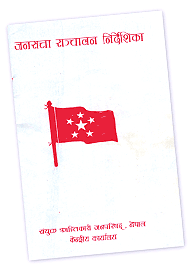 Nepal's Maoists consider themselves outlaws and do not adhere to the laws of the land. But a document has just come to light in which the rebel group gives itself the legal right to take human life. As advocates of 'pro-people' power, they can now legally issue death sentences with safaya (cleansing) and janakarbahi (people's action).
Nepal's Maoists consider themselves outlaws and do not adhere to the laws of the land. But a document has just come to light in which the rebel group gives itself the legal right to take human life. As advocates of 'pro-people' power, they can now legally issue death sentences with safaya (cleansing) and janakarbahi (people's action). After abducting and killing Radio Nepal journalist Dekendra Raj Thapa in Dailekh in August, the head of the Maoist army's Western Command, Comrade Diwakar, issued a statement saying: 'Dekendra certainly committed a serious crime. But in line with the party's policy he should not have been killed because he was a journalist.'
In other words, it would have been ok to kill him if he wasn't a journalist. Had he not been one, the punishment would have been 'just'. If this is any indication of the way Maoist justice is going to work, the nation needs to be on high alert. It has set the precedence for the rebels to pick anyone who has made a mistake, knowingly or unknowingly, and order their execution.
 The rebels have not yet made their law of capital punishment public. But the central member of the Maoists and the Seti-Mahakali regional bureau in-charge Lekh Raj Bhatta (Comrade Rakesh) told us recently that the underground party has a legal manual allowing capital punishment. "Anyone who commits a serious crime will be sentenced to death," he says without specifying what constitutes a 'serious' crime.
The rebels have not yet made their law of capital punishment public. But the central member of the Maoists and the Seti-Mahakali regional bureau in-charge Lekh Raj Bhatta (Comrade Rakesh) told us recently that the underground party has a legal manual allowing capital punishment. "Anyone who commits a serious crime will be sentenced to death," he says without specifying what constitutes a 'serious' crime. That Maoist revolutionary law sanctions capital punishment is probably not surprising. Nepali law itself does not allow death penalty, even though a recent Nepal Police draft badapatra tried to supersede the constitution by provisioning death penalty in its charter. After the clause was leaked to the press, and following an outcry, the final version of the document did not contain the provision.
The worrying thing is that Maoist rulings for capital punishment do not need approval of the central party leadership, the death penalty has been 'decentralised' to the rebel's district and village courts. These revolutionary justice systems run by the rebels are allowed to and can decide who should live and who should die, and the accused can't defend themselves with lawyers. For instance, if the rebels file a case in their local court stating that someone be executed for alleged crimes, the court is not likely to reverse the decision. Local 'people's governments' have already been issuing death warrants and killing those found guilty.
Comrade Rakesh, who is also a Maoist central member, defends the move, saying the local courts are independent. "We don't interfere with the court's decisions on death sentences," he told us, adding that regional people's government were fully autonomous and were authorised to decide everything except defence and foreign affairs.
Although the 'people's council' has provisioned death penalty, the ruling regulation prepared by the council's chief Baburam Bhattarai does not clearly specify it. The document's security chapter says that 'feudalistic and imperialistic forces will be destroyed'. It has also specified that any one or any agency that violates the fundamental rights of the people will be punished severely.
A separate provision in the council's regulatory says that any work against the country, people and the people's war will be regarded as 'enemy action'. The clause goes on to hint that such offenders will be sentenced to death, but the language is not clear.
Nowhere have the Maoists spelt out the kind of offense that will be subjected to capital punishment. Comrade Rakesh, however, says he has understood it to mean that murderers and informers will be sentenced to death. "We will certainly give them the chance to refrain from such activities, but if they do not improve, they will be executed," he adds. This includes party members and cadre who turn traitors. "If they have committed a crime, they will have to die," says Comrade Rakesh. "There are no exceptions in the law."


